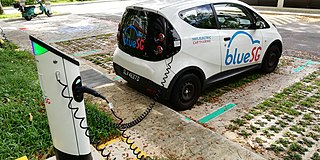
Biogas is a mixture of gases, primarily consisting of methane, carbon dioxide and hydrogen sulphide, produced from raw materials such as agricultural waste, manure, municipal waste, plant material, sewage, green waste, wastewater, and food waste. It is a renewable energy source.
Syngas, or synthesis gas, is a mixture of hydrogen and carbon monoxide, in various ratios. The gas often contains some carbon dioxide and methane. It is principally used for producing ammonia or methanol. Syngas is combustible and can be used as a fuel. Historically, it has been used as a replacement for gasoline, when gasoline supply has been limited; for example, wood gas was used to power cars in Europe during WWII.
Distributed generation, also distributed energy, on-site generation (OSG), or district/decentralized energy, is electrical generation and storage performed by a variety of small, grid-connected or distribution system-connected devices referred to as distributed energy resources (DER).

Tokyo Institute of Technology is a national research university located in Greater Tokyo Area, Japan. Tokyo Tech is the largest institution for higher education in Japan dedicated to science and technology, one of first five Designated National University and selected as a Top Type university of Top Global University Project by the Japanese government. It is generally considered to be one of the most prestigious universities in Japan.
General Atomics (GA) is an American energy and defense corporation headquartered in San Diego, California, specializing in research and technology development. This includes physics research in support of nuclear fission and nuclear fusion energy. The company also provides research and manufacturing services for remotely operated surveillance aircraft, including the Predator drones, airborne sensors, and advanced electric, electronic, wireless, and laser technologies.
Underground coal gasification (UCG) is an industrial process which converts coal into product gas. UCG is an in-situ gasification process, carried out in non-mined coal seams using injection of oxidants and steam. The product gas is brought to the surface through production wells drilled from the surface.

Clean technology, in short cleantech, is any process, product, or service that reduces negative environmental impacts through significant energy efficiency improvements, the sustainable use of resources, or environmental protection activities. Clean technology includes a broad range of technology related to recycling, renewable energy, information technology, green transportation, electric motors, green chemistry, lighting, grey water, and more. Environmental finance is a method by which new clean technology projects can obtain financing through the generation of carbon credits. A project that is developed with concern for climate change mitigation is also known as a carbon project.

The Gubkin Russian State University of Oil and Gas is a public university in Moscow, Russia. The university was founded in 1930 and is named after the geologist Ivan Gubkin. The university is colloquially known as Kerosinka, meaning 'kerosene stove'.

The Korea University of Science and Technology (UST) is a group of public research institutions in Seoul, Suwon, Changwon, Ansan, Seongnam and Daejeon, in South Korea. UST is the leading government-funded research university dedicated to the synergistic effects of research and education in Science and Technology. The UST was established in 2003 by the Ministry of Science, ICT and Future Planning as the nation’s graduate school specializing in science and engineering education and research. The UST runs only a graduate school. Creating the new driving force for growth would play a major role in leading national growth in the new century. The South Korean government established the UST to produce professionals in the field of combined technologies, thought of as one of the most important criteria for creating the driving force for South Korea's national growth. Today, UST continues to develop itself into a major research university.

Valence Technology, Inc. was a company that developed and manufactured lithium iron phosphate cathode material as well as lithium ion battery modules and packs. The modules come in 12 V, 18 V, 24 V, and 36 V configurations. Valence's products are used in electric vehicle and plug-in hybrid electric vehicles (PHEVs) such as cars, scooters, motorbikes, and commercial vehicles such as buses, delivery vans and trucks. Valence batteries are also used in wheelchairs, medical carts, robotics, marine, rail, as well as stationary applications such as remote power, uninterruptible power supply (UPS), energy storage systems, frequency regulation and switching gear.
Independent Energy Partners, Inc. (IEP) is an oil shale resources company based in Parker, Colorado, the United States. It is a developer of the Geothermic Fuels Cells Process, an in-situ shale oil extraction process. CEO of the company is Alan K. Forbes.
In the Petroleum industry, Integrated operations (IO) refers to the integration of people, disciplines, organizations, work processes and information and communication technology to make smarter decisions. In short, IO is collaboration with focus on production.
EcoCAR: The NeXt Challenge was a yearly competition from 2008 to 2011, that built on the 19-year history of U.S. Department of Energy (DOE) advanced vehicle technology competitions by giving engineering students the chance to design and build advanced vehicles to demonstrate cutting-edge automotive technologies, with the goal of minimizing the environmental impact of future personal transportation. The DOE has again joined General Motors (GM), the Government of Canada, and other sponsors for this new competition series, named the EcoCAR Challenge. Argonne National Laboratory, a DOE research and development facility, will organize and operate the EcoCAR Challenge. Some previous types of advanced vehicle technology competitions include FutureTruck, FutureCar, and Challenge X. these type of competitions are usually supported by one or more of the Big Three American Automobile Manufacturers.
CrystaSulf is the trade name for a chemical process used for removing hydrogen sulfide (H2S) from natural gas, synthesis gas and other gas streams in refineries and chemical plants. CrystaSulf uses a modified liquid-phase Claus reaction to convert the hydrogen sulfide (H2S) into elemental sulfur which is then removed from the process by filtration. CrystaSulf is used in the energy industry as a mid-range process to handle sulfur amounts between 0.1 and 20 tons per day. Below 0.1 tons of sulfur per day is typically managed by H2S Scavengers and applications above 20 tons per day are typically treated with the Amine – Claus process.
Cenovus Energy Inc. is a Canadian integrated oil and natural gas company headquartered in Calgary, Alberta.
The Single Electricity Market encompassing the entire island of Ireland does not, and has never, produced any electricity from nuclear power stations. The production of electricity for the Irish national grid (Eirgrid), by nuclear fission, is prohibited in the Republic of Ireland by the Electricity Regulation Act, 1999 . The enforcement of this law is only possible within the borders of Ireland, and it does not prohibit consumption. Since 2001 in Northern Ireland and 2012 in the Republic, the grid has become increasingly interconnected with the neighbouring electric grid of Britain, and therefore Ireland is now partly powered by overseas nuclear fission stations.

Michael Evan Webber is the Josey Centennial Professor in Energy Resources in the Walker Department of Mechanical Engineering at The University of Texas at Austin and CTO of Energy Impact Partners, a $3 billion cleantech venture fund. Webber’s expertise spans research and education at the convergence of engineering, policy, and commercialization on topics related to innovation, energy, and the environment.
Banwari Lal is an Indian environmental and industrial biotechnologist and the director of the Environmental and Industrial Biotechnology Division at The Energy and Resources Institute (TERI). Known for the development of oilzapper technology, Dr. Lal is the chief executive officer of ONGC-TERI Biotech Limited, a collaborative venture between TERI and the Oil and Natural Gas Corporation since 2008. The Department of Biotechnology of the Government of India awarded him the National Bioscience Award for Career Development, one of the highest Indian science awards, for his contributions to biosciences in 2004. He have many Indian and international joint patents with ONGC, DBT, IOCL, OIL INDIA and TERI.

Ranjith Pathegama Gamage, a Fellow of the Australian Academy of Technology and Engineering, is an Australian academic based at Monash University, where he holds the position of Professor in Geomechanics Engineering. His research has significantly influenced understanding of the Carbon sequestration. He has also developed new sustainable technologies for extracting resources from deep earth and natural gas from coal seams, shale, and tight geological formations.
Olagoke Olabisi is an author, editor, educator, mentor, inventor, and entrepreneur. A Nigerian–American chemical engineer, Olagoke is the Chief Consultant and CEO of Infra-Tech consulting LLC, an energy consulting company focused on corrosion and materials engineering. He has 9 patents and a total of 97 publications including Fugacity and Vapor Pressure of Non-Polar Liquids at Low Temperatures, Thermoplastics Beyond the Year 2000: A Paradigm, and Handbook of Thermoplastics, 2nd Edition. He has been involved in academia and industry in the United States, Nigeria, Saudi Arabia, and Kuwait. He is a mentor to students and young professionals.







